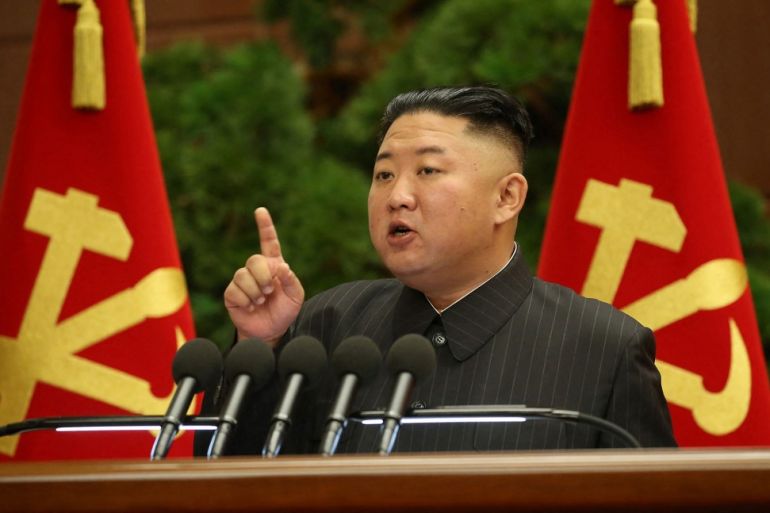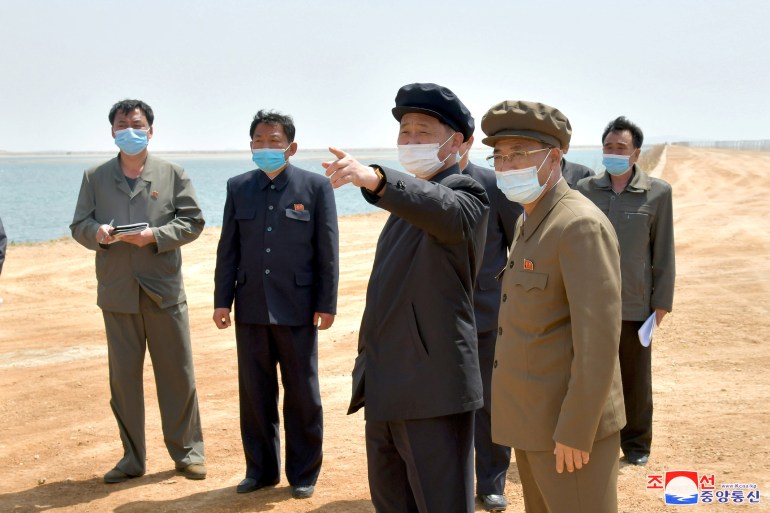North Korea’s Kim fumes about ‘grave lapses’ in pandemic defences
Several senior officials replaced for ‘incompetence and irresponsibility’ in their efforts to stop the spread of COVID.

North Korean leader Kim Jong Un chastised top governing party officials for failures in the response to the COVID-19 pandemic that led to an unspecified “grave incident” and put the safety of the country and people at risk, state media reported on Wednesday.
The report by state news agency KCNA did not elaborate on what happened, or how it put people at risk, South Korea’s Yonhap news agency said.
Keep reading
list of 3 itemsUS envoy offers to meet North Korea ‘anytime, anywhere’
Kim’s sister ridicules US’s ‘wrong expectation’ for talks
“By neglecting important decisions of the party in its national emergency antivirus fight in preparations for a global health crisis, officials in charge have caused a grave incident that poses a huge crisis to the safety of the nation and its people,” Kim was quoted by Yonhap as saying.
“A major factor that hampers the execution of important tasks is inability and irresponsibility of senior officials,” he added.
“Party-wide fight should be carried out against ideological defects and all kinds of negative factors found among senior officials.”
North Korea has not officially confirmed any cases of the coronavirus, a claim questioned by South Korean and US officials.
But the reclusive country has imposed strict anti-virus measures, including border closures and domestic travel curbs.
Kim called a meeting of the Workers’ Party of Korea politburo to address some party executives’ neglect of duty, including failing to implement important long-term measures to fight the pandemic, KCNA said.
The politburo meeting came 11 days after the country held a highly publicised four-day plenary session of the Workers’ Party for the third time this year.
Leif-Eric Easley, a professor at Ewha University in Seoul, says Kim’s comments could be seen as an indication that health conditions have deteriorated and the government is making the political preparations necessary to accept coronavirus vaccines from abroad.
“Up to this point, the Kim regime has doubled down on international isolation during the pandemic,” he said in an email. “It is unfortunate there are so few diplomats and aid workers from other countries currently in North Korea. Without many eyes and ears on the ground, it is increasingly difficult to assess the situation, and without their trusted hands, it will be harder to deliver assistance to the people who need it most.”
Government shake-up
Several politburo members, secretaries of the central committee, and officials of several state agencies were replaced at the meeting, although KCNA did not specify if the shake-ups were related to the neglect of pandemic-related duty.
Ever since the pandemic began, North Korean state media has highlighted anti-coronavirus efforts and officials have exhorted the people to remain vigilant.
Kim himself tearfully thanked his people for not having had any cases at a military parade in October.
Nonetheless, Pyongyang’s coronavirus defence has come at a high price.
Its self-imposed and strictly enforced blockade has left it more isolated than ever: trade with Beijing – its economic lifeline – has slowed to a trickle while all international aid workers have left the country.

This month, Pyongyang admitted it was tackling a food crisis, sounding the alarm in a nation with a moribund agricultural sector that has long struggled to feed itself.
Earlier, Kim warned his people to prepare for the “worst-ever situation”.
Pyongyang has been looking to shore up loyalty to the authorities, with state television last week showing a resident of the capital expressing concern and saying everyone was “heartbroken” over the “emaciated” condition of Kim, who has lost significant weight in recent weeks.
Analysts said Pyongyang is using Kim’s appearance as a way to glorify him by portraying him as a “devoted, hardworking” leader as the country struggles to tackle its food crisis and other challenges.
In recent months, Kim has issued a series of lengthy letters to regime organisations, such as the Youth League and the trade union federation, exhorting them to pursue “loyalty and patriotism”.
At the same time, authorities have mounted a campaign against “criminal” youths tarnished by foreign influences that are “dangerous poisons” to state ideology, according to KCNA.